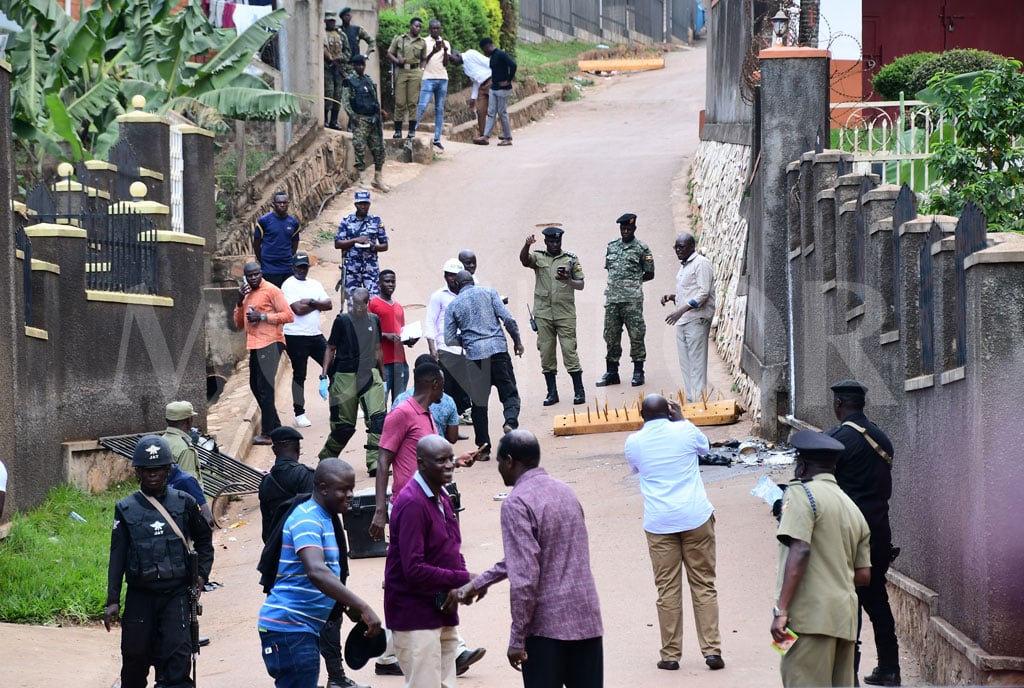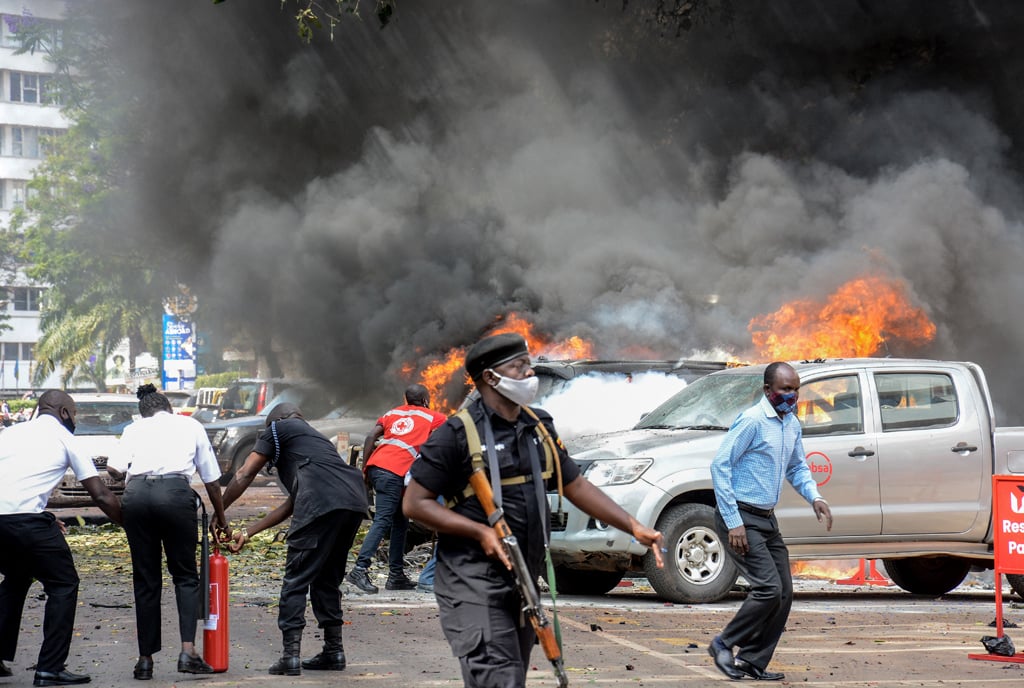Prime
Inside Uganda’s battle with terrorist threats

A security team at the scene of crime after a controlled-explosion of a bomb outside Rubaga Miracle Centre church in Kampala on September 3, 2023. PHOTO / ABUBAKER LUBOWA
From last week, there was intensified buzz in intelligence feeds that a terror attack in Uganda was imminent, prompting officials to place frontline personnel on high alert.
Sources involved in defusing the plot, or briefed on the matter, said spy and security agencies had for weeks monitored the threat first picked through technical interception and analysis of communication.
The operatives then used human sources to corroborate the information, with the latest in-country terror threat issued by neighbouring Kenya adding to the urgency.
The British government was the latest of international partners to issue an alert in July that a terrorist attack in Uganda was “very likely”, meaning the question was when rather than whether.
This was slightly over a month after 44 people were killed in an attack on Lhubiriha-Mpondwe Secondary School in Kasese District, which the state blamed on the Allied Democratic Forces (ADF) based in the Democratic Republic of Congo (DRC).
Ugandan officials also said they had picked similar signals, although both provided no specifics on place and time or the masterminds.
It is the missing pieces of the jigsaw puzzle – except for the identity of the plotter(s) - that intelligence agencies believe they fixed last week by pointing places of worship as the more likely target.
Police and military surveillance teams then activated reconnaissance on profiled suspected and widened the catchment by bolstering both covert and overt deployment at key installations where many congregate.
Places secured by Counter-Terrorism (CT) teams, plain-clothed police and military detectives and elements from other sister security agencies included churches and mosques, shopping malls and popular hangouts.
Those efforts yesterday morning, sources familiar with the operations said, led to the interception of a suspected bomber outside Pastor Robert Kayanja’s Rubaga Miracle Church in Kampala’s western outskirt.
“We thank God … we thank our security agencies … because they put up a resistance so that these terrorists would not walk to harm the church [goers]. The bomb is very dangerous and they [suspected attackers] would have done a lot of harm,” Pastor Kayanja told journalists outside his church.
With four services held yesterday alone, any successful explosion could likely have brought down the church and “we probably would be mourning”, he said, asking Ugandans to heed to terror alerts and exercise vigilance.
Information about an imminent terrorist attack reportedly issued by police in Kampala began circulating late last week and it was widely shared on social media.
As panic swept through worshippers, it emerged that the midday catch at the gate of Rubaga Miracle Church of a 28-year-old suspect had more to do with luck.
Sources involved in the operation said a sniffer dog on site failed to detect the Improvised Explosive Device (IED) concealed inside a food flask in a backpack, and the would-be explosive was found when officers on the ground put the suspect at gun point and insisted on a physical search.
“In the bag … there was an IED … the food flask [contained powder], nails, battery of a motorcycle, which was the charger, [he] had used a [mobile] phone [handset] which was supposed to be a switch for it, detonator, booster charger…,” said Mr Patrick Onyango, the Kampala Metropolitan Police spokesman.
The police bomb squad was alerted and appeared at the scene, alongside scene of crime officers (SOCOs) and a team from the Joint Anti-Terrorism Taskforce (JATT), comprising operatives from different security and intelligence groups, to mop up the place. Also at hand were officers from the Chieftaincy of Military Intelligence (CMI), the investigative arm of Uganda People’s Defence Forces (UPDF), to whom police handed over the suspect for interrogation.
Investigators taped off the site as a scene of crime and bomb experts moved to detonate the IED in a controlled blow up. Following the detonation, investigators were unable to immediately retrieve the SIM card, making it unclear if it was in the assembled set or with another runaway suspect.
Information on the SIM card, which contains specifics of purchase location and any call log(s) or messaging, is crucial in mapping the network and geo-spatial details of those involved in planning and executing the terror plot.
It was such information gleaned from SIM card recovered from an IED explosion scene in the city’s suburban Makindye Division that enabled military investigators involved in the 2010 twin bombing attacks to unearth the suspects and dismantle their network.
Such is the same method police and the army drafted to inquire into yesterday’s threat with the hope of achieving positive results. According to police, on Saturday an IED was also defused at Nabukera Plaze in Kampala Central Business District.
“We are still looking for that SIM card, although we have the [mobile] phone [handset],” Mr Onyango said in relation to yesterday’s operation.
The suspect taken into custody upon arrest reportedly told interrogators that they numbered at least four and each had been assigned to carry out an attack at different locations within the city.
Security forces were by last night combing different parts of the city in the hope of recovering the explosives and arresting the suspects.
One sources told this publication that a preliminary examination showed the IED units carried by the suspect out side Rubaga Miracle Centre were incomplete, suggesting an accomplice had either slipped through the security net into the church or developed cold feet and fled upon detecting tightened security at the church.
In yesterday’s accounts to journalist, Mr Onyango said: “The suspect is [in] our custody, we have interrogated him and he told us that they were sent four of them (sic) to execute missions in different places. The three others are being trailed by the security.”
Despite the inherent risks, residents, then faithful and passersby crowded near the scene as the bomb experts detonated the IED near a perimeter wall fence after ordering motorists to move their vehicles away. It remained unclear who the masterminds of yesterday’s planned attack was, with no group claiming responsibility by press time.
However, security agencies heightened preparedness anticipating that ADF terror cells in the country could plot an attack to avenge the killing, last week in DRC, of the group’s top commander and IED manufacture instructor Fazul.
The ADF, which identifies itself as a Central Africa Province of the Islamic State, is originally a Ugandan rebel group that the UPDF expelled from its western Uganda lairs into the DRC. The Ugandan military has, alongside the Congolese army, been pursuing the outlaws and other insurgent/militia groups in eastern DRC under the Operation Shujaa launched in November 2021.
Previous attacks
June 17, 2023: Forty-four people were killed in an attack on Lhubiriha-Mpondwe Secondary School in the western Kasese District, which the state blamed on the Allied Democratic Forces (ADF).
November 16, 2021: Four killed, 33 injured in twin explosives in central Kampala. Security forces detonated two other Improvised Explosive Devices (IEDs).
October 25, 2021: Suspected terrorists blast an IED on a bus on Kampala-Masaka highway, killing one person.
October 23, 2021: One person dies and several injured in IED explosion in Kamamboga, Kampala suburb.





